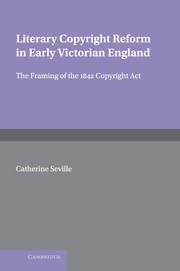Book contents
- Frontmatter
- Contents
- Acknowledgements
- 1 INTRODUCTION
- 2 PETITIONS AND COPYRIGHT
- 3 CRITICS IN PARLIAMENT
- 4 CRITICS IN THE BOOK TRADE I: PRINT WORKERS AND THEIR ALLIES
- 5 CRITICS IN THE BOOK TRADE II: PUBLISHING AND PUBLISHERS
- 6 THE CAMPAIGN IN THE DAILY PRESS
- 7 AUTHORS AND THE BEGINNINGS OF AUTHORS' ORGANISATIONS
- 8 THE MAKING OF THE CASE FOR THE BILL
- 9 CONCLUSION
- Appendix I Chronology of the bills
- Appendix II Successive versions of the bill
- Appendix III The Copyright Act 1842
- Bibliography
- Index
6 - THE CAMPAIGN IN THE DAILY PRESS
Published online by Cambridge University Press: 18 July 2009
- Frontmatter
- Contents
- Acknowledgements
- 1 INTRODUCTION
- 2 PETITIONS AND COPYRIGHT
- 3 CRITICS IN PARLIAMENT
- 4 CRITICS IN THE BOOK TRADE I: PRINT WORKERS AND THEIR ALLIES
- 5 CRITICS IN THE BOOK TRADE II: PUBLISHING AND PUBLISHERS
- 6 THE CAMPAIGN IN THE DAILY PRESS
- 7 AUTHORS AND THE BEGINNINGS OF AUTHORS' ORGANISATIONS
- 8 THE MAKING OF THE CASE FOR THE BILL
- 9 CONCLUSION
- Appendix I Chronology of the bills
- Appendix II Successive versions of the bill
- Appendix III The Copyright Act 1842
- Bibliography
- Index
Summary
Parliamentarians involved in the 1842 compromise felt an obligation to consider public opinion: Macaulay's repeated reference to the public interest, and Peel's anxiety that he should not be seen to support ‘monopoly’, show that this feeling was not confined to radicals. Newspapers were the primary route for the dissemination of parliamentary proceedings, and in some ways act as a barometer – albeit rather unreliable – of public opinion.
After 1832, when the composition of membership of the House of Commons began to change, the House was increasingly influenced by outside opinion. Conduct of ministers and members had already been affected by the greater publicity given to the proceedings of the House. Although members at first resisted publication of reports of their debates, fearing misrepresentation and disliking the publicity, they had tacitly abandoned the right to prevent such publication in 1771. In 1830 the House began to reserve special seats in the public gallery for the use of reporters, resulting in the first series of Hansard's Debates. Details of parliamentary proceedings were also available in the newspapers, which published very full reports. Ministers and members thus became accountable to a much wider range of public opinion, and equally began to look to impress public opinion with their speeches and questions.
For a time the House of Commons had preserved the anonymity of members who had voted for and against particular motions.
- Type
- Chapter
- Information
- Literary Copyright Reform in Early Victorian EnglandThe Framing of the 1842 Copyright Act, pp. 128 - 148Publisher: Cambridge University PressPrint publication year: 1999



